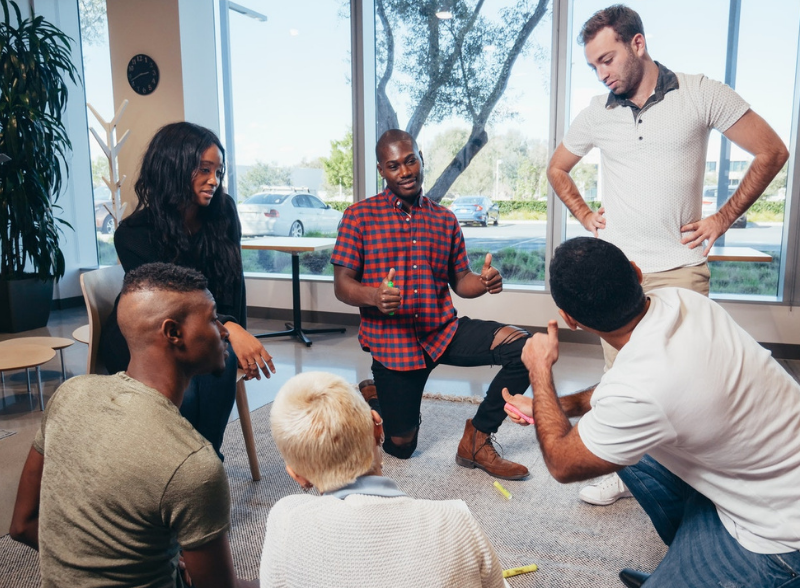Why You Need to Co-Create If You Want to Build an Authentic Company Culture
The more ownership we have over something, the greater we value it.
Think of those times you baked a cake for a friend’s birthday and felt extreme pride, or assembled that flat pack furniture which despite taking you hours and a bit of blood and tears feels like your masterpiece.
Our obsession with DIY isn’t just a desire to keep it cheap, ‘the IKEA effect’ is a real form of cognitive dissonance where we value something more if we put effort into it.
As identified by behavioural economist Dan Ariely, his Harvard led study discovered that when people build or assemble things, such as an IKEA bookcase or a ready-mix cake, they like the things more because of the effort and self-involvement.
The most fascinating part of this goes well beyond what we make at home. It also relates to the input we have in our workplaces.
We all want a say in how work gets done. In how the office looks and feels, and most of all what behaviours as a group we’re willing to tolerate, and what we’re not.
The IKEA effect is just as important in our workplaces, if not more important than it is in our daily lives.
Although it may feel like a mammoth task to involve your entire company in shaping the culture of your business, it’s critical if you want to create a lasting and effective culture change.
Engagement, but make it easy
The term employee engagement gets thrown around in the HR world so much that it has lost all meaning.
We’ve sanitised our language in the workplace that we forget that at the heart of it, people just want to be part of shaping their work and how they do it.
Having involvement in the creation of the culture drives people to make better decisions, and to feel a sense of belonging. When this occurs, the true essence of company culture is alive and well.
The trouble is, too often we want things to be quick and easy. But when has anything worthwhile been quick or easy?
Involving all of your people in the creation of your company culture may sound like hard work, but the reality is once you get the ball rolling, you’ll be surprised at how many people want to become the ambassadors of change.
Whether you’re a CEO or HR leader, you’re not alone in your desire to build a better workplace, so don’t think that you need to do it alone.
The default for many businesses is to send out an employee engagement survey and claim they are building a ‘co-created culture’. There are no focus groups, team exploration, or real deep dives into the biggest areas getting in the way of the culture.
I’ve mentioned previously why relying on data alone is a fool’s game. So instead, consider all the ways in which you can facilitate conversation and idea sessions on what’s really coming up for people.
One view is a biased view
Another tendency I’ve seen regularly in businesses is for one person to be spearheading the change like a culture hero, or it coming from a very top-down approach. Dictating the culture rather than collaborating with the people who are living it. You’d be surprised at how out of touch this approach is, and how quickly it will turn even the most loyal person into one who begins job seeking.
As former CEO of Traidcraft Robin Roth put it so eloquently in our podcast conversation, businesses have an amazing amount of diversity in their business, but they too often only seek the viewpoint of the top.
Or to put in another way, a beautiful quote from author James Clear, says,
“The longer you’re a teacher, the less you remember what it is like to be a student.
The longer you’re a doctor, the less you remember what it is like to be a patient.
The longer you’re a coach, the less you remember what it is like to be a player.
Change positions. A new perspective can improve your old methods.”
Without sometimes realising it we are so biased in our viewpoint, that we forget that others see our ideas in very different ways.
As the need for more diversity and inclusion grows, co-creation is where the real impact lies.
Giving everyone a voice to contribute, collaborate and create a culture that not only represents the business but the people and customers who are part of it.
The approach is also vital for cross-national teams.
If you have people working all over the world it’s easy to fall into one way of doing things in France, one way of doing things in America, and another in the UK just because it feels easy to let every team decide for themselves how to work. We can immediately become quite lazy, but this can fuel poor communication and cultural nightmares that make it difficult for people to feel a sense of belonging, and to understand what’s expected of them.

Where to start
- Have a clear organisational mission and vision in place, to begin with.
- Host workshops with varied team members to start bringing ideas together.
Remember that a culture change won’t happen overnight. It takes time, and patience, and will have a life of its own before it feels fully integrated into the business. The more conversations you can have, and the less pressure you put on it, the more organic it will become.
If you would like support on your culture journey, contact me today about facilitating team culture workshops.








